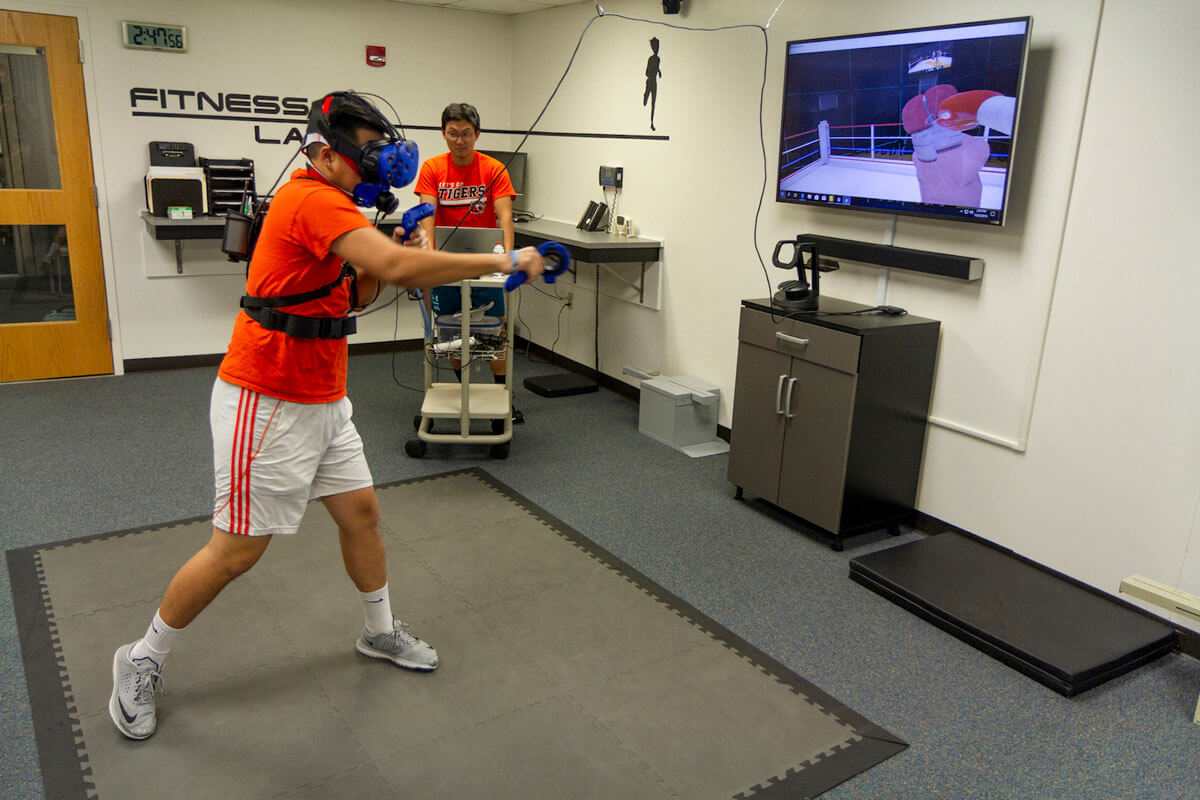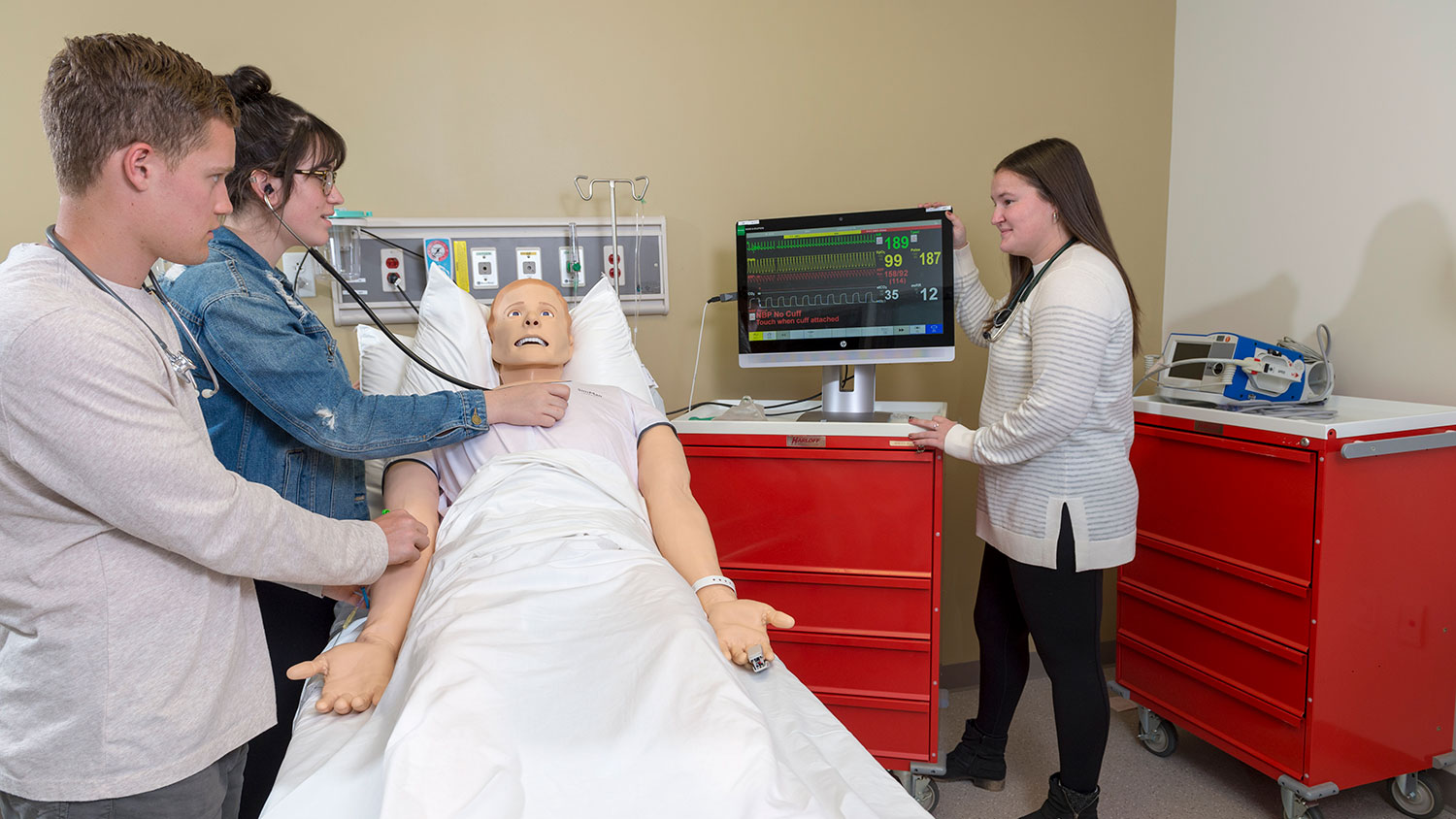Exercise Science Minor
- RIT /
- Rochester Institute of Technology /
- Academics /
- Exercise Science Minor
Overview for Exercise Science Minor
The exercise science minor includes foundation sequences in anatomy and physiology upon which the basic principles of exercise physiology, fitness assessment, and the preparation of fitness programs are built. The minor prepares students to sit for professional certification examinations for work in the fitness industry, provides understanding of sports physiology for those interested in sports equipment design and technology, and complements and enhances personal fitness.
Notes about this minor:
- This minor is closed to students majoring in exercise science.
- Posting of the minor on the student's academic transcript requires a minimum GPA of 2.0 in the minor.
- Notations may appear in the curriculum chart below outlining pre-requisites, co-requisites, and other curriculum requirements (see footnotes).
- At least nine semester credit hours of the minor must consist of specific courses not required by the student’s degree program.
The plan code for Exercise Science Minor is EXRSCI-MN.
Curriculum for 2024-2025 for Exercise Science Minor
Current Students: See Curriculum Requirements
| Course | ||
|---|---|---|
| Electives | ||
| Choose five of the following: | ||
| EXSC-150 | Introduction to Exercise Science |
|
In this initial course of the Exercise Science undergraduate curriculum, students will be introduced to a broad array of topics within the field. Through an introductory review of body systems and physiological concepts students will gain an understanding and appreciation for the processes of response and adaptation which enhance and improve both health and fitness of people who exercise regularly. Career options will be reviewed and explored giving students an informed exposure to potential areas of future employment. (Prerequisites: BIOL-121 or equivalent course.) Lecture 3 (Spring). | ||
| EXSC-205 | Sports Physiology & Life Fitness |
|
This course goes inside the science of physical fitness providing the student with an in depth physiological understanding of how the body adapts and improves through exercise activity. Students actively perform a series of self-assessments which they must analyze in order to determine their current state of fitness. With this data students develop exercise programs tailored to their needs and interests. Stress management and nutrition are examined allowing students to incorporate these two important areas into their plans to be fit for life. Lecture 3 (Fall, Spring, Summer). | ||
| EXSC-206 | Fitness Prescription |
|
This course provides instruction to prepare participants for certification as a Personal Trainer. Students will learn to competently assist others in developing, practicing, and maintaining fitness enhancing exercise programs. Students will gain the knowledge, skills and abilities to properly assess physical fitness, assist participants in setting fitness goals, develop appropriate exercise programs, and enhance participant exercise adherence. (Prerequisites: (MEDG-101 and MEDG-103) or (MEDG-102 and MEDG-104) or BIOL-101 or BIOL-121 or (BIOL-123 and BIOL-125) or (BIOL-124 and BIOL-126) or equivalent courses.) Lecture 3 (Fall). | ||
| EXSC-207 | Exercise for Special Populations |
|
This course is designed for those who are interested in the science of exercise and fitness for individuals with diagnosed disease states, or high performance requirements. The theoretical and diagnostic value of exercise testing will be reviewed. This information will then be used to create exercise prescriptions and understand the therapeutic benefit that exercise will have on specific conditions such as rheumatoid arthritis, diabetes, hypertension, heart disease, and obesity. High performance individuals functioning in challenging environments such as, astronauts, high altitude climbers, and ultramarathoners will also be considered. (Prerequisites: EXSC-205 or EXSC-206 or equivalent course.) Lecture 3 (Spring). | ||
| EXSC-210 | Human Motor Behavior |
|
Human movement is complex and learning to move is an essential component of a lifetime of healthy activity. Exploring the nexus of learning and movement is the primary aim of this course. Using application-based activities students will develop the skills to recognize movement patterns, perform assessments, and correct inefficient movement. After successful completion students will be able to provide appropriate instruction leading to better movement mechanics, reduced risk of injury, and higher levels of athletic performance. (Prerequisites: MEDS-250 or equivalent courses.) Lec/Lab 3 (Spring). | ||
| EXSC-270 | Group Exercise |
|
Group exercise has progressed to include a wide variety of activities, equipment and environments. This course explores both the dynamics of group participation as well as techniques of instruction across a number of modalities including; hi/low impact, step training, kickboxing, sport conditioning, stationary indoor cycling, water exercise, yoga, and Pilates. Students will not only learn theory but will also design and teach classes to one another. Graduates of the class will be prepared to achieve certification in many of the modalities included in the course. (Prerequisites: (MEDG-101 and MEDG-103) or (MEDG-102 and MEDG-104) or BIOL-101 or BIOL-121 or (1026-211 and 1026-231) or (1026-212 and 1026-232) or (1026-213 and 1026-233) or 1001-201 or 1001-251 or equivalent course(s).) Lab 1.5, Lecture 1.5 (Fall). | ||
| EXSC-280 | Strength Training for Performance |
|
Stronger athletes make better athletes no matter what the sport and this course teaches techniques of optimal training to enhance the muscular fitness of all manner of athletes. Physiological principles of strength development and basic musculoskeletal anatomy are reviewed and general program design is discussed. Utilizing case studies, students develop sport specific programs which will be presented to the class. Students will also produce strength training manuals outlining appropriate guidelines for improved performance. (Prerequisites: (MEDG-101 and MEDG-103) or (MEDG-102 and MEDG-104) or BIOL-101 or BIOL-121 or (BIOL-123 and BIOL-125) or (BIOL-124 and BIOL-126) or equivalent courses.) Lec/Lab 3 (Fall). | ||
| EXSC-320 | Coaching Healthy Behavior |
|
This course will teach students to encourage those with long standing lifestyle habits that contribute to their chronic illness to change is a very challenging proposition. It addresses this problem by incorporating psychological, sociological and counseling principles, along with coaching skills, into an intervention technique that emphasizes the positive and leads people to choose and adhere to a wellness lifestyle. Students will review case studies and meet with professionals in the field. (Prerequisites: (MEDG-101 and MEDG-103) or (MEDG-102 and MEDG-104) or BIOL-101 or BIOL-121 or (BIOL-123 and BIOL-125) or (BIOL-124 and BIOL-126) or equivalent courses.) Lecture 3 (Spring). | ||
| EXSC-360 | Worksite Health Promotion |
|
A growing number of employers are recognizing the value of healthier, more physically fit employees and are providing health promotion programs through a variety of innovative means. This course will examine the theoretical basis for employee health programs as well review several case studies. Students will have the opportunity to visit and review local programs as well as design a model program to present to the class. (Prerequisites: (MEDG-101 and MEDG-103) or (MEDG-102 and MEDG-104) or BIOL-101 or BIOL-121 or (1026-211 and 1026-231) or (1026-212 and 1026-232) or (1026-213 and 1026-233) or 1001-201 or 1001-251 or equivalent course(s).) Lecture 3 (Fall). | ||
| EXSC-370 | Senior Adult Fitness |
|
Our nation's growing population of senior citizens presents both challenges and opportunities to our healthcare system. This class explores the opportunities and the processes of enhancing the physical fitness and functional capacity of aging adults. Principles of assessment, prescription and adherence are modified to meet the needs of senior citizens and students will examine several case studies. Students get to apply what they’ve learned by designing and conducting exercise sessions with actual participants. (Prerequisites: (MEDG-101 and MEDG-103) or (MEDG-102 and MEDG-104) or BIOL-101 or BIOL-121 or (1026-211 and 1026-231) or (1026-212 and 1026-232) or (1026-213 and 1026-233) or 1001-201 or 1001-251 or equivalent course(s).) Lecture 3 (Fall). | ||
| EXSC-380 | Sports Psychology |
|
“Keeping your head in the game” is one of the hallmarks of success for high performance athletes and this course explores the psychological aspects of achieving that capability. Through examining research based evidence of successful practices and techniques to produce, that winning edge, students will become versed in the process of coaching athletes to possess and function with athletic “mental toughness.” (Prerequisites: (MEDG-101 and MEDG-103) or (MEDG-102 and MEDG-104) or BIOL-101 or BIOL-121 or (1026-211 and 1026-231) or (1026-212 and 1026-232) or (1026-213 and 1026-233) or 1001-201 or 1001-251 or equivalent course(s).) Lecture 3 (Spring). | ||
| EXSC-410 | Kinesiology |
|
As a study of human movement this course will cover topics that begin with a review of the functional anatomy of the musculoskeletal system including both the upper and lower extremity as well as the spinal column and thorax. Factors of linear and rotary motion are reviewed along with postural analysis and movement elements associated with pushing, pulling and throwing objects. There is no separate Lab for this class and laboratory experiences will be incorporated into specifically designated lecture times. At the conclusion of this course students will have a functional capability to assess the intricacies of human movement. (Prerequisites: MEDS-250 or equivalent courses.) Lab 3, Lecture 3 (Fall). | ||
| EXSC-420 | Biomechanics |
|
The study of mechanics as it pertains to living organisms is the basis of biomechanics. Principles of physics are applied to human motion with movements being analyzed for their relationship to statics and dynamics. Kinematics and kinetics are explored within the context of sports performance and functional human locomotion. (Prerequisite: EXSC-410 and PHYS-112 or equivalent courses.) Lab 3, Lecture 3 (Spring). | ||
| EXSC-430 | Theory of Athletic Injuries |
|
Even the very best athletes experience injury and being able to recognize and respond to those conditions is a crucial skill for those who will work with athletes. Students will learn the signs and symptoms of injury and the process of first response as well as how to support athletes through rehab. Successful students will learn how to incorporate injury reduction techniques into the training programs they develop for the athletes they serve. (Prerequisites: (MEDG-101 and MEDG-103) or (MEDG-102 and MEDG-104) or BIOL-101 or BIOL-121 or (BIOL-123 and BIOL-125) or (BIOL-124 and BIOL-126) or equivalent courses.) Lec/Lab 3 (Fall). | ||
| EXSC-480 | Training High Performance Athletes |
|
Aerobic capacity, strength, flexibility, speed, power, agility, nutrition, and rest are all crucial to the success of athletes and for trainers the need to appropriately coordinate all these factors is a significant challenge. This course explores the interrelationship of the multifactorial principles of athletic performance. Using case studies, modeling, flow sheets and scheduling plans students develop techniques that will lead athletes to success in their training routines. (Prerequisites: (MEDG-101 and MEDG-103) or (MEDG-102 and MEDG-104) or BIOL-101 or BIOL-121 or (BIOL-123 and BIOL-125) or (BIOL-124 and BIOL-126) or equivalent courses.) Lec/Lab 3 (Spring). | ||
| EXSC-540 | Clinical Therapeutic Exercise |
|
Exercise elicits responses and adaptations from the body. In those living with chronic disease, exercise induced metabolic changes improve physiological function, enhancing health and functional capacity, while also reducing the risk of exacerbation or complications. Several chronic conditions will be explored with a culminating focus on the cardiovascular system. Come learn why the cardiovascular system benefits the most while presenting the greatest risk. (Prerequisites: MEDS-250 and MEDS-251 or equivalent courses.) Lecture 3 (Spring). | ||
| EXSC-550 | Exercise Physiology |
|
Exercise Physiology is the scientific basis for the field of exercise science. This course provides students with an opportunity to deepen their understanding of the body’s responses and adaptations to exercise. Neuromuscular physiology is reviewed along with energy systems and mechanisms of fatigue. The cardiorespiratory system is examined with a focus on control and regulation during activity and there is a look at the physiological components of exercise training. Environmental factors that impact sport activities as well as training techniques which optimize performance will be reviewed. The differences in performance and adaptation that exist between children, adolescents, and adults as well as between males and females will be compared and contrasted. Exercises influence on long term health and fitness will conclude the course. Laboratory experiences will allow students to integrate and apply the concepts of exercise physiology through investigative experiments. (Prerequisites: MEDS-250 and MEDS-251 or equivalent courses.) Lab 3, Lecture 3 (Fall). | ||
| EXSC-589 | Topics in Exercise Science |
|
Topics in Exercise Science engages learners to explore topics in exercise science that are either novel findings, of current concern, hold media interest, or require a unique presentation platform. Course content and delivery methods will vary for each course offering, but will include development of professional presentation skills, interpretation of evidence-based resources, and translation to future health and fitness practice. Lecture 3 (Fall, Spring, Summer). | ||
| MEDS-250 | Human Anatomy and Physiology I |
|
This course is an integrated approach to the structure and function of the nervous, endocrine, integumentary, muscular and skeletal systems. Laboratory exercises include histological examination, actual and simulated anatomical dissections, and physiology experiments with human subjects. (Pre-requisite: (BIOL-123 and BIOL-124 and BIOL-125 and BIOL-126) or (BIOL-123 and BIOL-124) or (BIOL-101 and BIOL-102) or (BIOL-121 and BIOL-122) or MEDG-102 or equivalent course or NUTR-BS or NUTRSC-BS students.) Lab 3, Lecture 3 (Fall). | ||
| MEDS-251 | Human Anatomy and Physiology II |
|
This course is an integrated approach to the structure and function of the gastrointestinal, cardiovascular, immunological, respiratory, excretory, and reproductive systems with an emphasis on the maintenance of homeostasis. Laboratory exercises include histological examinations, anatomical dissections and physiological experiments using human subjects. (Pre-requisite: (BIOL-123 and BIOL-124 and BIOL-125 and BIOL-126) or (BIOL-123 and BIOL-124) or (BIOL-101 and BIOL-102) or (BIOL-121 and BIOL-122) or MEDG-102 or equivalent course or NUTR-BS or NUTRSC-BS students.) Lab 3, Lecture 3 (Spring). | ||
| NUTR-300 | Sports Nutrition |
|
This course will provide an introduction to the integration between exercise and nutrition-related topics by exploring the intimate link among nutrition, energy metabolism, and human exercise response. The course content will sort fact from fiction and help students and practitioners obtain the knowledge they need to give sound advice to athletes and active individuals. (Prerequisite: College level science course preferred.) Lecture 3 (Fall, Spring, Summer). | ||
Contact
Program Contact
- William Brewer
- Senior Lecturer
- Exercise Science Program
- College of Health Sciences and Technology
- wsbscl@rit.edu
Offered within
the
Wegmans School of Health and Nutrition
Wegmans School of Health and Nutrition











